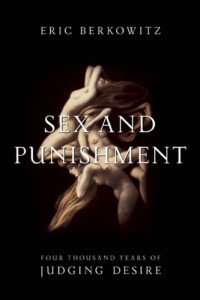
An Overview of Gay Punishments
Interview with author Eric Berkowitz.
by Kit van Cleave
Photo by Jennifer Berkowitz

Eric Berkowitz is a San Francisco writer and lawyer with a master’s degree in journalism from the University of Southern California. He has published in the Los Angeles Times and LA Weekly, and with the Associated Press. He has also served as legal editor of the daily legal newspaper The Los Angeles Daily Journal. No wonder he decided to base his new book, Sex and Punishment: Four Thousand Years of Judging Desire, on cases from pagan times to today, in which people were punished for their sexual choices.
Kit van Cleave: You begin your book by outlining traditions of sexual boundaries in pagan times. While not much was precluded then, was the case of Postimius against the Bacchus orgies the first time a powerful politician tried to close down a religious sect for personal gain?
Eric Berkowitz: I really don’t know whether it was the first time, but it was indeed a major occasion. In this case, it was the fear of homosexuality being used against the upper-class boys of Rome, and thereby weakening them, that helped the scandal to spread across Italy. Fear of homosexuality was just used as a pretext to allow various political forces in Rome to tighten their grip on Italy. As is often the case, sexual fears—especially fears of deviant sex, such as certain kinds of homosexuality—are used for political gain.
At that time, male-to-male sex was widespread. Was the feminization of the sexual receiver seen as damaging the national spirit?
In pagan times, especially in Rome, sex was not governed by who was doing it, but how it was done. To be the passive party in any sex act was to be seen as being dominated, or taken. Conversely, to be the active party, to be the penetrator, was to be dominant—to be the person who takes. In that equation there was only one winner. So, the feminization of men, turning Roman aristocrats into passive homosexuals, was seen as not necessarily damaging the national spirit but turning the men who were supposed to defend Rome into women. Since women were not highly regarded, this was seen as weakening Rome itself.
What of Jewish prescriptions on homosexuality, which preceded Christianity’s defining this activity as a mortal sin?
The Jews were unique in that period, in making all homosexual sex—passive and active—into a sin. They did that as part of a general effort to define themselves as not being like other groups that lived around Israel at the time. Homosexuality was very widespread, and not really condemned in any major way then. So the Jews, like any other group who tried to define themselves, used sexual habits to achieve this. By saying, “We don’t have people of the same gender having sex,” they were saying, “We are not like those around us.” That geopolitical move caused a lot of suffering for many people for thousands of years.
 How did Augustine influence Christianity’s two thousand years of fear and hatred of homosexuals?
How did Augustine influence Christianity’s two thousand years of fear and hatred of homosexuals?
Augustine was a really fascinating person, and probably the greatest devil in sexual law I can think of. Augustine’s achievement, if you want to call it that, is to link the entire sexual urge to the devil. To Augustine, every single sexual urge, every thought, every sexual act, was a reminder that humankind was no longer living in the Garden of Eden. Every stirring of the genitals was the devil talking. For him, all sex clearly pulled humans away from God and toward hell. This created a paradox, because without sex the species would stop. [As the Catholic Church] gradually made exceptions to Augustinian thought—sex in marriage only, and solely for the purpose of procreation and without pleasure, if that is possible—homosexuality immediately stood out as an activity that could never be accepted.
Because homosexual sex has no possibility of procreation and is engaged in for reasons that have nothing to do with creating families, it was inevitable that the hostility toward homosexuals would grow. They stood as living examples of how pleasurable sex could be and how absurd the idea is of having sex while trying not to enjoy it. That’s not how humans were made. That’s not how Augustine was made, and that’s not how people are supposed to be. Homosexuals became the “other” people—“other” than Christian people. Augustine’s denial of the sexual urge became a green light toward oppression of those whose sexual urge exists for itself alone.
Let’s face it. The whole idea of civil rights could not happen unless the century defined and codified individuality and the movement happened in a democracy.
I agree, though I’m not necessarily sure that a democracy was required. But the idea of individuality is definitely important. More specifically, the idea is that an individual has rights vis-à-vis everyone else, so the individual does not necessarily exist as part of a system of other people.
I’m doing research now for my next book, about the liberation of women during the twentieth century. Much has already been published, but still, so much is fascinating. For example, it was not until the latter part of the twentieth century that rules allowing men to rape their wives were finally thrown out of all U.S. states. That means women did not have individual sexual rights vis-à-vis their husbands. They [could simply be regarded as] sexual blowup dolls for the husbands to use at will. At the same time, individual rights of children, and those of people who come from lower classes, have also been slow to be recognized. Before, they weren’t. Look at the Dominique Strauss Kahn controversy. He was able to leave the country without going to jail, but the fact that an African maid was able to disgrace him to the extent that she did is a huge achievement. Mostly upper-class people were able to take advantage of those beneath their class without any consequences at all.
In the twenty-first century, eradication of anti-sodomy laws is a critical recognition of the individual rights of gay people to pursue sex for its own sake and only for its own sake, and not to be criminalized. That has been a long time coming; activists have further to go. But at the same time, individuals now have the right to pursue their own sexual pleasure and not to be defined because of color, race, or class as someone else’s sexual property. That is a huge achievement.
Click here to read a review of Sex and Punishment.
Kit van Cleave is a freelance writer living in Montrose. She has published in local, national, and international media.










